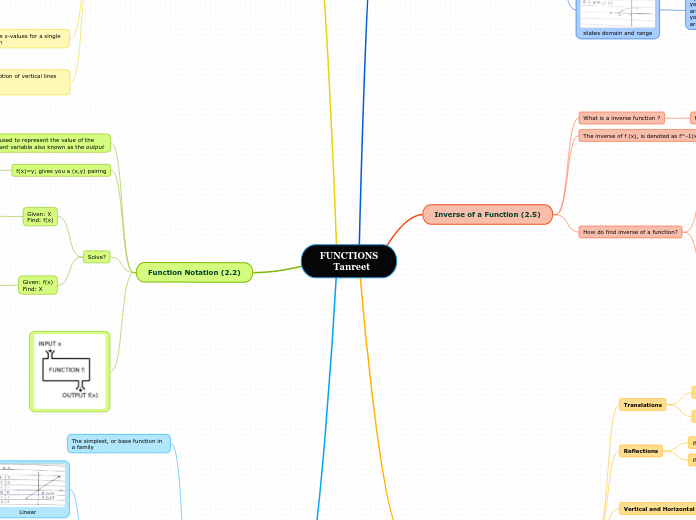FUNCTIONS
Tanreet
Domain & Range (2.4)
Domain - Independent Variable (all "x" values)
Range - Dependent Variable (all "y" values")
Format for stating the domain and range
Set Notation: a way of writing a set of items or numbers
ex. {XER-X cannot=0}
Examples
states domain and range
By looking at the graph you can see all x values are less than 3 and you can see all y values are greater than 0
states domain and range
By looking at the graph you can see all x values are greater than -5 and you can see all y values are great than o
Inverse of a Function (2.5)
What is a inverse function ?
two functions that “reverse” each other
"x" and "y" are switched
The inverse of f (x), is denoted as f^-1(x)
read as “f inverse at x”
How do find inverse of a function?
switching x & y and isolating for y
switching x & y and isolating for y
Using Transformations to Graph Functions
Translations
Vertical Translations
if the function is y= f(x) + c, function shifts up
if the function is y= f(x) - c, function shifts down
Horizontal Translations
if the function is y = f(x-d) function shifts right
if the function is y = f(x+d) function shifts left
Reflections
if a < 0 - reflection in the x-axis
if k < 0 - reflection in the y-axis
Vertical and Horizontal Stretches & Compressions
if a > 1 - vertical stretch
if a < 1 - vertical compression
if k > 1 - horizontal compression
if k < 1 - horizontal stretch
Use this knowledge to graph functions
purple has gone through transformations
purple has gone through transformations
Relations & Functions (2.1)
Domain - Independent Variable (all "x" values)
Range - Dependent Variable (all "y" values")
Set Notation: a way of writing a set of items or numbers
ex. {XER-X cannot=0}
Relations vs Functions
Relation: is a set of ordered pairs (x,y)
Function: A special relation. An ordered pair where for every value of x, there is only one value of y.
Function or Not
Vertical Line Test: If any vertical line passes through more than one point on the graph of a relation then the relation is NOT a function
function
passes vertical line test
not a function
does not pass vertical line test
Check X Values: If there are 2 or more x-values for a single y-value, then the graph is not a function
not a function
Lines: Always a function with the exception of vertical lines Circle: Never a function
Parabola: Always a function
Function Notation (2.2)
f(x) is used to represent the value of the dependant variable also known as the output
Read as “f at x” or “f of x”
f(x)=y; gives you a (x,y) pairing
Other symbols can be used to name the outputs of functions instead of “f” to fit problem
Solve?
Given: X
Find: f(x)
solve for y
Given: f(x)
Find: X
solve for x
Parent Graphs (2.3)
The simplest, or base function in a family
Parent Functions
Linear Function
Quadratic Function
Square Root Function
Absolute Value Function
Reciprocal Function
Linear
Quadratic
Square Root
Absolute Value
Reciprocal
Asymptote: A line that the graph of a relation or function gets close to, but never touches
